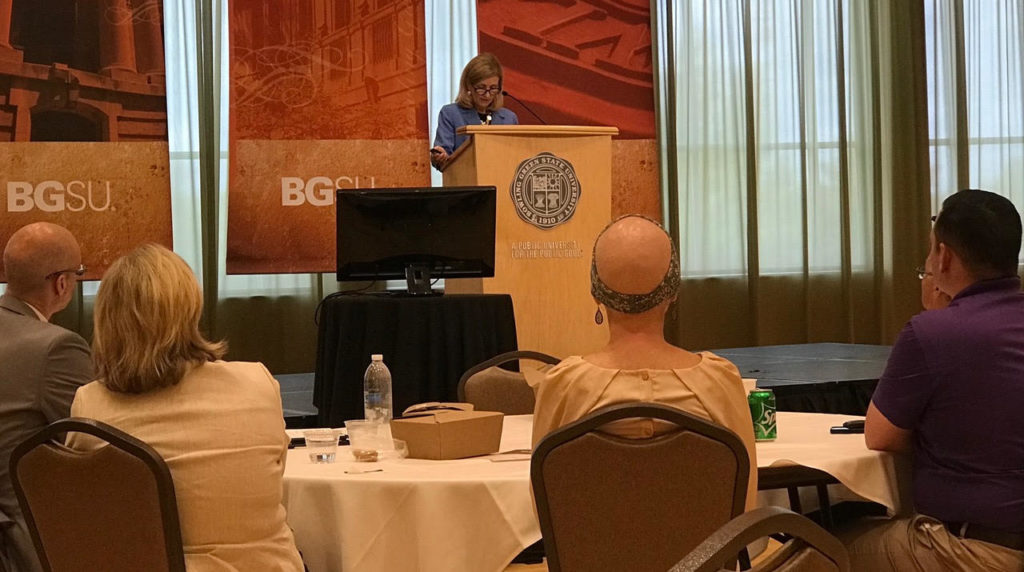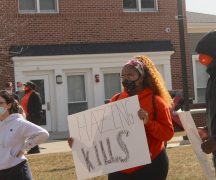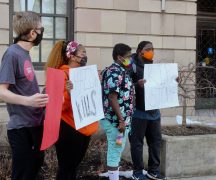By DAVID DUPONT
BG Independent News
About 200 educators and administrators from more than two dozen institutions gathered Tuesday at Bowling Green State University to address the seemingly intractable problem of hazing.
“Our goal is to insure that we can eradicate hazing on college campuses,” the summit’s host BGSU President Rodney Rogers told the press.
Most came from higher education, but others who serve students as young as kindergartners were also on hand for the first Ohio Anti-Hazing Summit.
Rogers opened with a statistic that showed the depth of the problem. At least one college student has died in the United States from hazing in every year since 1959. The exception was 2020, the year when most campuses were largely shuttered because of the COVID-19 pandemic.
In March 2021, Stone Foltz, a BGSU sophomore from Delaware, died from alcohol poisoning following an initiation ritual at a college fraternity.
The university, Rogers said, has always addressed hazing, but now has redoubled its efforts to crack down, not only in Greek organizations, but in all organizations. “Our work has always been to eradicate hazing.”
BGSU and the rest of higher education have new tools. Collin’s Law, named for Collin Wiant, an Ohio University student who died as the result of hazing, and a framework for addressing hazing developed by the Inter-University Council of Ohio, an association of the state’s public universities, after the death of Foltz.
Rogers said that following “a tragedy on our campus,” BGSU decided to take a leadership role in addressing the new responsibilities under Collin’s Law and the IUC framework.
Collin’s Law, which had gotten bogged down in the Ohio Senate earlier, passed in the wake of Foltz’s death. The law, among other provisions, makes hazing a felony. Because it went into effect in fall, those charged with Foltz’s death faced misdemeanor hazing charges.
Six of the defendants accepted plea deals, while two Jacob Krinn and Troy Henricksen went to trial in May.
Krinn was guilty of hazing, failure to comply with underage drinking laws, and obstructing official business, all misdemeanors. Henricksen was found guilty of eight counts of counts of hazing involving all members of the Pi Kappa Alpha new member class and seven counts of failure to comply with underage alcohol laws.
Their sentencing is scheduled for later this month.

The keynote address was given by Elizabeth Allan, a professor of higher education at the University of Maine. “We share a mutual desire to keep students safe,” she told participants.
Before Allan taught she worked in student services at Ohio State. That’s where she learned about the impact of hazing from her students. As she started to looked into the problem, she discovered a lack of resources. Subsequently she and her husband launched the website stophazing.org.
And through that work Allan became a magnet for reporters writing on hazing stories.
The attitude about hazing was that, except in the extreme cases that got all the news coverage, just “harmless antics,” she said.
Many people, she said, still hold that narrow view of what hazing is.
But there a continuum from intimidation, like name calling, the silent treatment, issuing demerits, to harassment like wearing embarrassing attire, sleep deprivation, verbal abuse, all leading to the most extreme forms of violence that cause injury and death.
The “lesser” forms are more frequent, but are less likely to be considered hazing, Allan said.
All forms of hazing can cause long-term psychological trauma, including substance abuse.
Hazing takes place in a group setting – this distinguishes it from bullying, Allan said. And a student’s strong desire to belong — a basic human emotional need –is manipulated in the power dynamic of hazing and makes it possible for the student to be coerced.
Hazing is wrong even if the student “consents,” she said. “That power dynamic means it may not be true consent.”
Yet the defense in the Krinn-Henricksen trial continually asked the fraternity pledge whether it was their choice to drink participate in these activities including drinking copious amounts of alcohol. All said yes. The defense contended Foltz made the decision to drink the fatal amount of whiskey.
When an expert witness for the prosecution, Gregory Parks, who teaches forensic psychology at the Wake Forest University School of Law, testified about the research behind the dynamic, the defense tried to dismiss it, going so far as to challenge the basic methods of social science research. That research, Allan said, must be the basis for any attempts to eliminate hazing.
Allan proposed taking a social science approach to combating hazing. That involves both education about the dangers to prevent it, as well as well as intervening to stop it when it occurs.
This takes the entire community, from individual students to school faculty and officials, parents and the wider community.
Efforts to combat it must take place in an environment with multiple layers, she said. This would be a strategy would help shift attitudes and beliefs.
And in addition to looking at groups that typically engage in hazing, Allan said, those procedures should also study group least likely to engage in hazing.
The summit, Rogers told the press, aims to have institutions share what works best on their campuses.
He said he hopes participants will bring back to their institutions “a sense of renewed energy around how they can continue to evolve and elevate the work.”
Asked about Greek organizations that have been sanctioned since Foltz’s death, Rogers saw that as a sign of progress. People now are empowered to come forward and report what they see. “I think the culture has begun to shift.”
While BGSU is taking a lead on this efforts. It faces its own legal difficulties.
The Foltz family is suing the university. The complaint maintains that BGSU knew about hazing within the Greek system and still “enthusiastically endorses Greek life to parents and students.”
[RELATED: Foltz family sues BGSU over son’s hazing death]
Rogers said he could not comment on the ongoing litigation.
But he added that there was a united front in the campaign to eradicate hazing. “All of us are united. It’s what we want to achieve. I know that’s what the Foltz family wants to achieve.”





